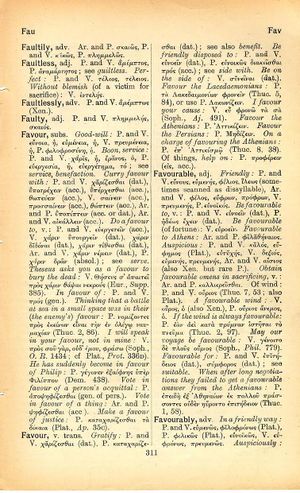favour: Difference between revisions
(CSV4) |
m (Text replacement - "<b class="b2">acc</b>" to "acc") |
||
| Line 10: | Line 10: | ||
<b class="b2">He has suddenly become in favour of Philip</b>: P. γέγονεν [[ἐξαίφνης]] ὑπὲρ Φιλίππου (Dem. 438). | <b class="b2">He has suddenly become in favour of Philip</b>: P. γέγονεν [[ἐξαίφνης]] ὑπὲρ Φιλίππου (Dem. 438). | ||
<b class="b2">Vote in favour of a person's acquittal</b>: P. ἀποψηφίζεσθαι (gen. of <b class="b2">pers.</b>). | <b class="b2">Vote in favour of a person's acquittal</b>: P. ἀποψηφίζεσθαι (gen. of <b class="b2">pers.</b>). | ||
<b class="b2">Vote in favour of a thing</b>: Ar. and P. ψηφίζεσθαι ( | <b class="b2">Vote in favour of a thing</b>: Ar. and P. ψηφίζεσθαι (acc). | ||
<b class="b2">Make a favour of justice</b>: P. καταχαρίζεσθαι τὰ δίκαια (Plat., <b class="b2">A</b>p. 35C). | <b class="b2">Make a favour of justice</b>: P. καταχαρίζεσθαι τὰ δίκαια (Plat., <b class="b2">A</b>p. 35C). | ||
'''v. trans.''' | '''v. trans.''' | ||
Revision as of 12:09, 26 August 2017
English > Greek (Woodhouse)
subs.
Good-will: P. and V. εὔνοια. ἡ, εὐμένεια, ἡ, V. πρευμένεια, ἡ, P. φιλοφροσύνη, ἡ. Boon, service: P. and V. χάρις, ἡ, ἔρανος, ὁ, P. εὐεργεσία, ἡ, εὐεργέτημα, τό; see service, benefaction. Curry favour with: P. and V. χαρίζεσθαι (dat.), ὑποτρέχειν (acc.), ὑπέρχεσθαι (acc.), θωπεύειν (acc.), V. σαίνειν (acc.), προσσαίνειν (acc.), θώπτειν (acc.), Ar. and P. ὑποπίπτειν (acc. or dat.), Ar. and V. αἰκάλλειν (acc.). Do a favour to, v.: P. and V. εὐεργετεῖν (acc.), V. χάριν ὑπουργεῖν (dat.). χάριν διδόναι (dat.), χάριν τίθεσθαι (dat.), Ar. and V. χάριν νέμειν (dat.), P. χάριν δρᾶν (absol.); see serve. Theseus asks you as a favour to bury the dead: V. Θήσευς σʼ ἀπαιτεῖ πρὸς χάριν θάψαι νεκρούς (Eur., Supp. 385). In favour of: V. and V. πρός (gen.). Thinking that a battle at sea in a small space was in their (the enemy's) favour: P. νομίζοντες πρὸς ἐκείνων εἶναι τὴν ἐν ὀλίγῳ ναυμαχίαν (Thuc. 2, 86). I will speak in your favour, not in mine: V. πρὸς σοῦ γὰρ, οὐδʼ ἐμοῦ, φράσω (Soph., O.R. 1434; cf Plat., Prot. 336D). He has suddenly become in favour of Philip: P. γέγονεν ἐξαίφνης ὑπὲρ Φιλίππου (Dem. 438). Vote in favour of a person's acquittal: P. ἀποψηφίζεσθαι (gen. of pers.). Vote in favour of a thing: Ar. and P. ψηφίζεσθαι (acc). Make a favour of justice: P. καταχαρίζεσθαι τὰ δίκαια (Plat., Ap. 35C). v. trans. Gratify: P. and V. χαρίζεσθαι (dat.). P. καταχαρίζεσθαι (dat.); see also benefit. Be friendly disposed to: P. and V. εὐνοεῖν (dat.), P. εὐνοικῶς διακείσθαι πρός (acc.); see side with. Be on the side of: V. συνεῖναι (dat.). Favour the Lacedaemonians: P. τὰ Λακεδαιμονίων φρονεῖν (Thuc. 5, 84), or use P. Λακωνίζειν. I favour your cause: V. εὖ φρονῶ τὰ σὰ (Soph., Aj. 491). Favour the Athenians: P. Ἀττικίζειν. Favour the Persians: P. Μηδίζειν. On a charge of favouring the Athenians: P. ἐπʼ Ἀττικισμῷ (Thuc. 8. 38). Of things, help on: P. προφέρειν (εἰς, acc.).

